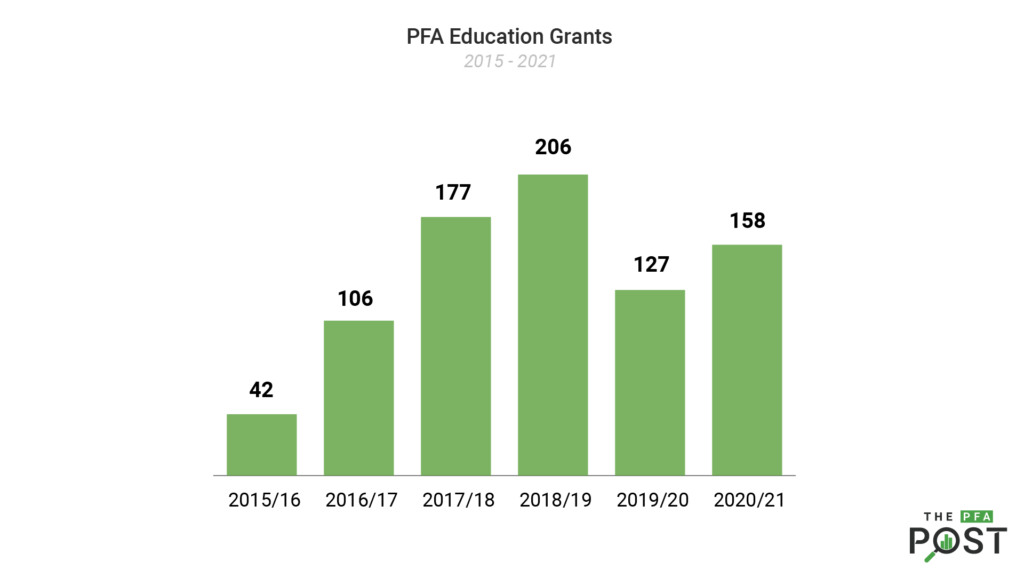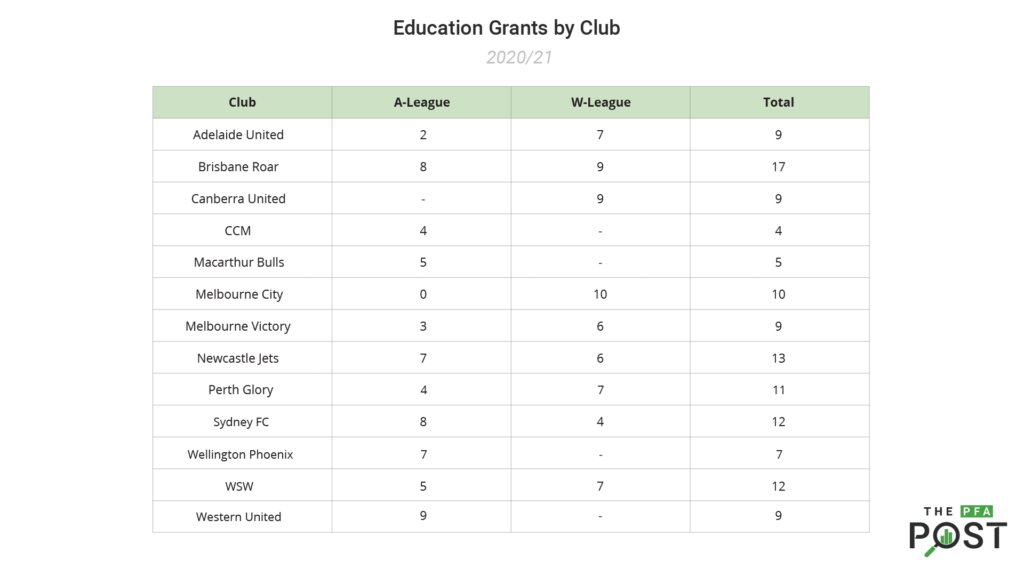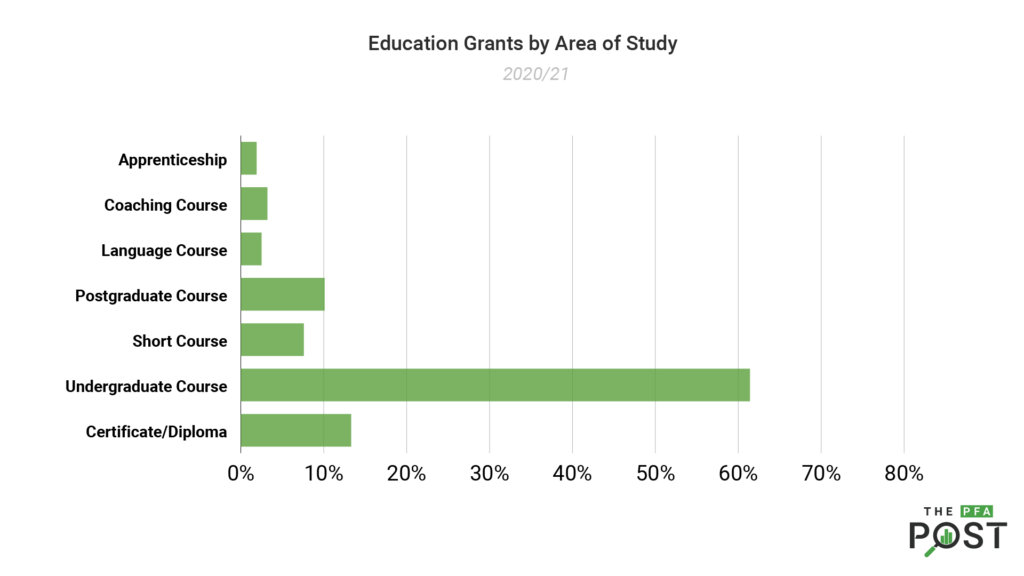Australian professional footballers have accessed over $1m in funding to accelerate their education and development off the pitch since 2015, the latest PFA Post reveals.
Following the Whole of Game collective bargaining agreement signed in 2015, 816 education grants have been accessed by 446 professional football players over a six-year period.
The funding, which is made available to players through the PFA’s Player Development Program and secured via Collective Bargaining Agreements with the Australian Professional Clubs and Football Australia (FA), has helped hundreds of players complement their football careers with academic opportunities and extra-curricular pursuits.
Players based overseas, within Australia’s two professional leagues and the National Teams, the Socceroos and Matildas, have accessed the funding, which helps them subsidise off-field development, allowing them to better balance and enhance their lives on and off the pitch.
📝 Summary
- 816 Education Grants have been accessed by Australian professional footballers based in Australia and overseas across the past six seasons
- Ranging from Matildas and Socceroos to W-League and A-League players, the investment in players equates to nearly $1.05m
- Players continue to be supported in 2020/21 with their off-field education and development in significant numbers, despite a reduction in football’s revenues, with 158 players accessing grants during the current season.
📈 Player Investment (2015 – 2021)
The Whole of Game Collective Bargaining Agreement and subsequent CBAs have provided incremental investment in player welfare and development programs, with education one of the critical areas of player development, alongside player welfare and transition and change.
Education offerings from the PFA ensure the holistic development of members, with the PFA assisting members to pursue both formal and informal study via education grants, education partnerships with leading institutions, including PFA Education Partner Torrens University, and PFA Scholarships.
The COVID-19 pandemic affected both the 2019/20 and 2020/21 periods due to a significant reduction in CBA funding; however, the number of grants allocated prior to the last two seasons had been trending upward, demonstrating an appetite from PFA members to pursue personal and professional development through their union.

📆 Current Season (2020/21)
During 2020/21, a total of 158 applications have been received by 80 male players and 78 female professional footballers. Of those players, 62 players play in the A-League, 65 in the W-League, two in the NPL, 29 overseas based-players.
- Total Grants Accessed: 158
- Gender Breakdown: 80 male, 78 female
- League Breakdown: A-League: 62; W-League: 65; NPL: 2; Overseas Players: 29; National Teams: Matildas: 10; Socceroos: 6
⚽ Club-By-Club (2020/21)
Within domestic Australian football, Brisbane Roar recorded the most players exploring extracurricular pursuits with a total of 17 players engaged in personal development, study or tertiary education, (8 A-League players and 9 W-League players), while Newcastle (13), Western Sydney Wanderers (12) and Sydney FC (12) have players engaged in study or development. Recent expansion clubs Macarthur and Western United have also had players take advantage of grants in their first seasons in the A-League.

🎓 Areas of Study and Development
From University degrees, short courses, coaching accreditation and language lessons, footballers are complementing their careers with a diverse range of study and professional development. Footballers often have an appetite for areas related to their profession, including exercise science, nutrition, coaching accreditation and fitness-related areas; however, there is a diversity of professions players are pursuing from teaching, law, science, counselling and even aircraft piloting.
The most popular areas of study across the past six years have been Undergraduate courses, with 50% of applications undertaking studies at University, while Certificate/Diploma (14%), Short courses (12%) and Coaching Accreditation courses (10%) accounting for other areas of study.

This is reflected within the 2020/21 cohort, with 97 players pursuing study in undergraduate degrees (61%), while VET, postgraduate and short courses were the areas pursued most frequently.

🎓 Player Examples: Teachers, Scientists, Bi-Lingual Athletes and Counsellors
There are countless players who are exploring interesting careers off the pitch. Sydney FC’s Remy Siemsen and Andrew Redmayne and Arsenal Women’s and Matildas’ Steph Catley are enrolled in a Bachelor of Education, with ambitions to become a primary school teachers.
Adelaide United’s Kahlia Hogg has a Bachelor of Mechanical Engineering, while Melbourne Victory’s Melina Ayres’ studies Environmental Science. Canberra United’s Nikki Flannery is studying a Bachelor of Architecture and Environments, while Matildas’ Mackenzie Arnold is enrolled in a Diploma of Nutrition through the PFA’s official Education Partner, Torrens University.
While adjusting to life playing for SønderjyskE in the Danish Superliga Lawrence Thomas is learning Danish, while the A-League’s Loïc Puyo is taking English lessons to help him integrate into Australian football.
Macarthur FC’s in-form midfielder Dennis Genreau complements his on-field form with a Diploma of Counselling, while Wellington Phoenix’s goalkeeper Stefan Marinovic is a trainee pilot.
🔗 The link between off-field development and high performance on it
In 2017 the National Rugby League in Australia commissioned an independent study, conducted by Professor David Lavallee, to assess the impact of engagement in the NRL CareerWise Programme on players, clubs and the NRL overall.
The study found that higher levels of CareerWise engagement, as determined through measurements of career decidedness and planning, were found to be significantly related to:
- being selected for the team when available (not injured, suspended or rested);
- the number of years contracted by a Club; and
- the number of years playing the NRL overall.
Engagement in Career Planning and Education was shown to predict player performance, overall years contracted by a club and overall years in the NRL. The CareerWise Programme was found to explain the significant relationships between engagement in Career Planning and Education and team selection, years contracted by a club and years in the NRL.
Captains and co-captains were found to be engaged in Career Planning and Education more than the average player and this resulted in significantly more team selections, years contracted by a club and years in the NRL.
The results illustrated that supporting athletes to prepare for life after professional sport not only ensured the game meets its most basic duty of care but also has a positive impact on sporting performance.







